I am bad at letting things marinate: ideas, problems, meat. The issue is I don’t know what I want to eat until an hour after I’m hungry, which is not the time to start a cooking pre-process. I want to get to the post-process: eating. Nothing will illicit a “Pass” faster from me than reading a recipe and realising I should have started it yesterday.
Which brings me back to marinating. I am so often confronted by the phrase, “marinate overnight,” which delights me. What if I’m a light sleeper? What if I’m a night owl and prep it at 11 p.m.? In a world where recipes strive to be so exact that there’s a textbook definition of “scant teaspoon,” how does anyone get away with “marinate overnight”?
I found myself wondering, does it even matter? I’d convinced myself not to bother with a quick marinade at 6 p.m., for dinner an hour or two later, because it surely wouldn’t be effective. Only proteins that have been immersed through a full cycle of the moon gain this magical additional flavour, or so I thought.
I figured this was worth investigating, so in a semi-scientific way, I set up a test to find out if marinating small, quick-cooking proteins overnight really was better than marinating them for an hour or two and, if it was, how much better.
The test
I gathered a cross section of quick-cooking proteins (and one vegetable) that would appease anyone: some boneless pork chops, chicken breasts (both of which are, in my opinion, flavourless on their own), an Italian eggplant, and some silken tofu. Marinating large cuts, whole birds, and meat with a lot of connective tissue would have to wait for another time. (This is supposed to be about quick dinner options, after all.)
I mixed up a few common marinades: a basic Asian concoction of soy, hoisin, black vinegar, some oyster sauce and sesame oil; a simple mix of yogurt and harissa; and fresh herbs, garlic, and lemon in olive oil.
I split the tofu and eggplant in half and applied the soy marinade to half of the tofu, then sliced the eggplant and applied the olive oil marinade to half of that. Each went in their own bags, with most of the air evacuated. For the meats, I chose nearly identical chicken breasts and pork chops, and put one of each in a bag, applying the yogurt to the chicken, and the soy to the pork chops. The other halves went into their own bags (a lot of Ziplocs died in this process), to wait for tomorrow.
I let the sun set. The moon rose. I took an edible, and then, as if by magic or REM cycle, it was morning. Around 1 p.m., I took the bags out and took a look. Everything seemed to be going swimmingly. I then took the unmarinated items and treated them like I had their twins the night before.
After two hours, I took everything out. The first set had been marinating for 18 hours or so, and the second set, just two hours. In my attempt to be as scientific as my ADHD would allow, I decided to cook everything as similarly as possible. The chicken and pork chops went into a sous vide water bath set to 60°C. The eggplant went onto a plate under the broiler. I happen to enjoy raw silken tofu, so I didn’t bother cooking it.
Does tofu benefit from a longer marinade?
Tofu being… tofu, I expected to see a ring from the soy sauce marinade, or at least a darker colour on the outside of one that marinated for 18 hours, but the outside of tofu blocks looked exactly the same. Weirdly, the marinades did not; the marinade in the bag that had sat overnight looked diluted, which made sense since tofu continues to expel whey, and salt from the marinade would pull moisture out through osmosis.
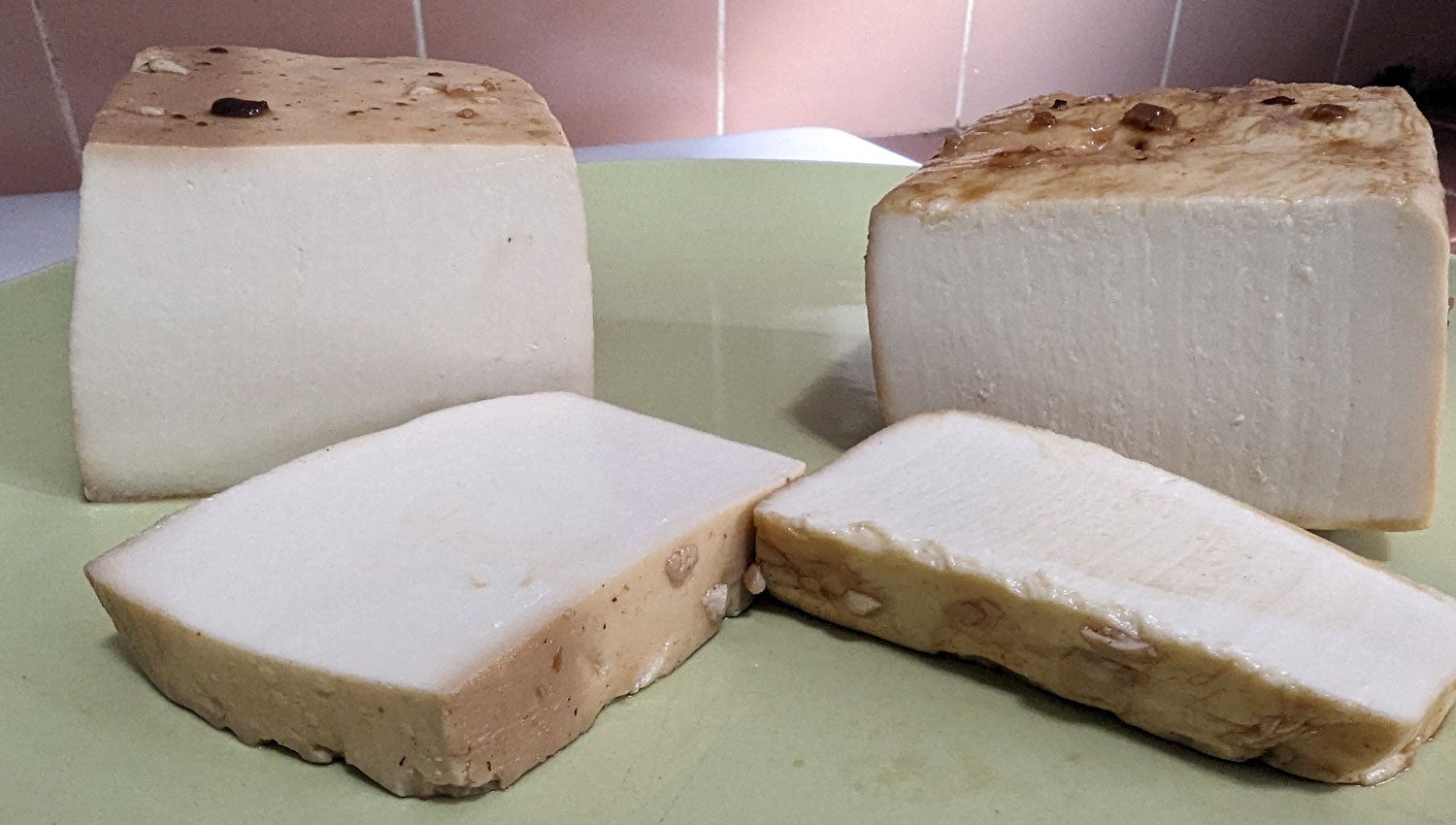
The inside of the blocks also looked the same, which disappointed me, until I took a bite. While the texture of both specimens were nearly identical, the taste on the longer marinade was far, far more flavorful. The tofu hadn’t taken on any colour, but it was infused with salt and umami. The two-hour marinade was fine, it added a little extra pep to the tofu, and wasn’t a waste. However, as someone who really loves hiyayakko, a dish of room-temperature raw tofu, treated with ginger, scallion and bonito flakes with some soy sauce, the better flavour of the overnight tofu made me decide to commit to the longer marinade.
(If this was how things continued to shape up this way, I would have to start visiting a fortune teller, so I could plan my marinades accordingly.)
Are grilled vegetables better with an overnight marinade?
It was clear, even in the bag, that the overnight marinated slabs of eggplant had taken on a far richer colour than the two-hour vegetable. Even still, the two-hour eggplant had been fully penetrated by the olive oil. The whole thing smelled magnificent.
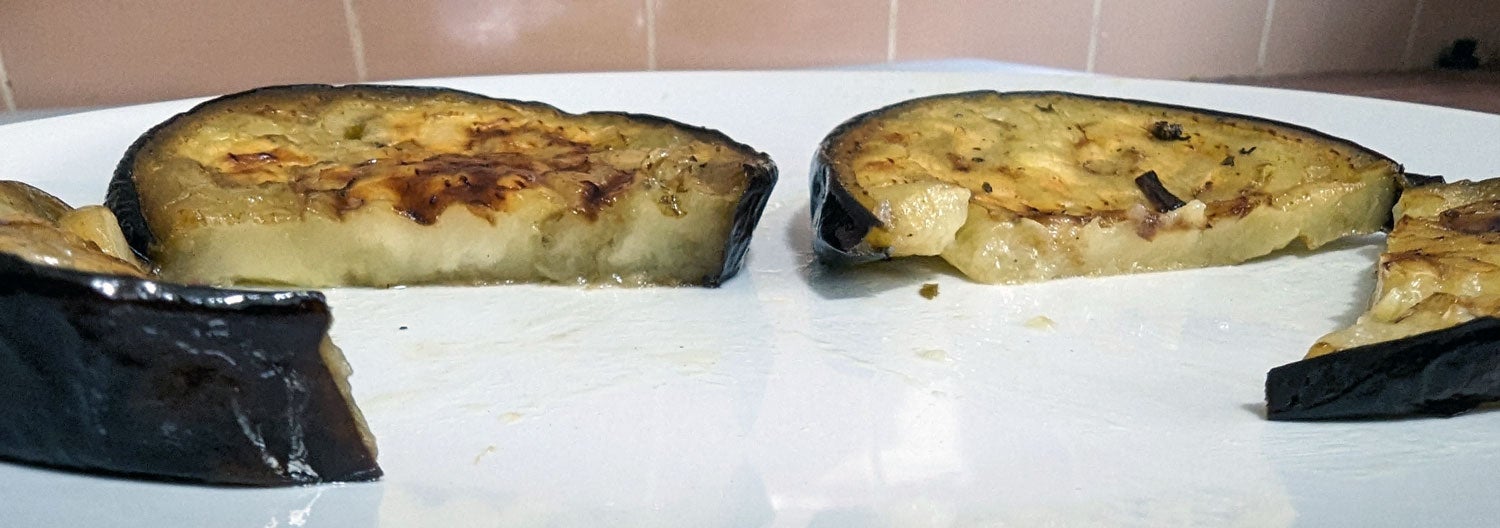
On a low broil, they both browned wonderfully. I had taken care to make the slices the same size and width for the test, and so I broiled them for ten minutes on one side and six minutes on the other.
Once cooked, it was hard to tell the difference, even when I cut them open. But the taste told the tale. I far preferred the texture and mouthfeel of the two-hour marinade. It tasted the same as the overnight marinade, but the two-hour eggplant just had a better texture, with more bite. Interesting.
Can a longer marinade make boneless pork chops taste like… anything?
Remember, the pork chops got the same soy marinade as the tofu, and then went into a sous vide at 60°C, which is a hair high for pork chops (but a hair low for chicken, and I’m lazy so I split the difference).
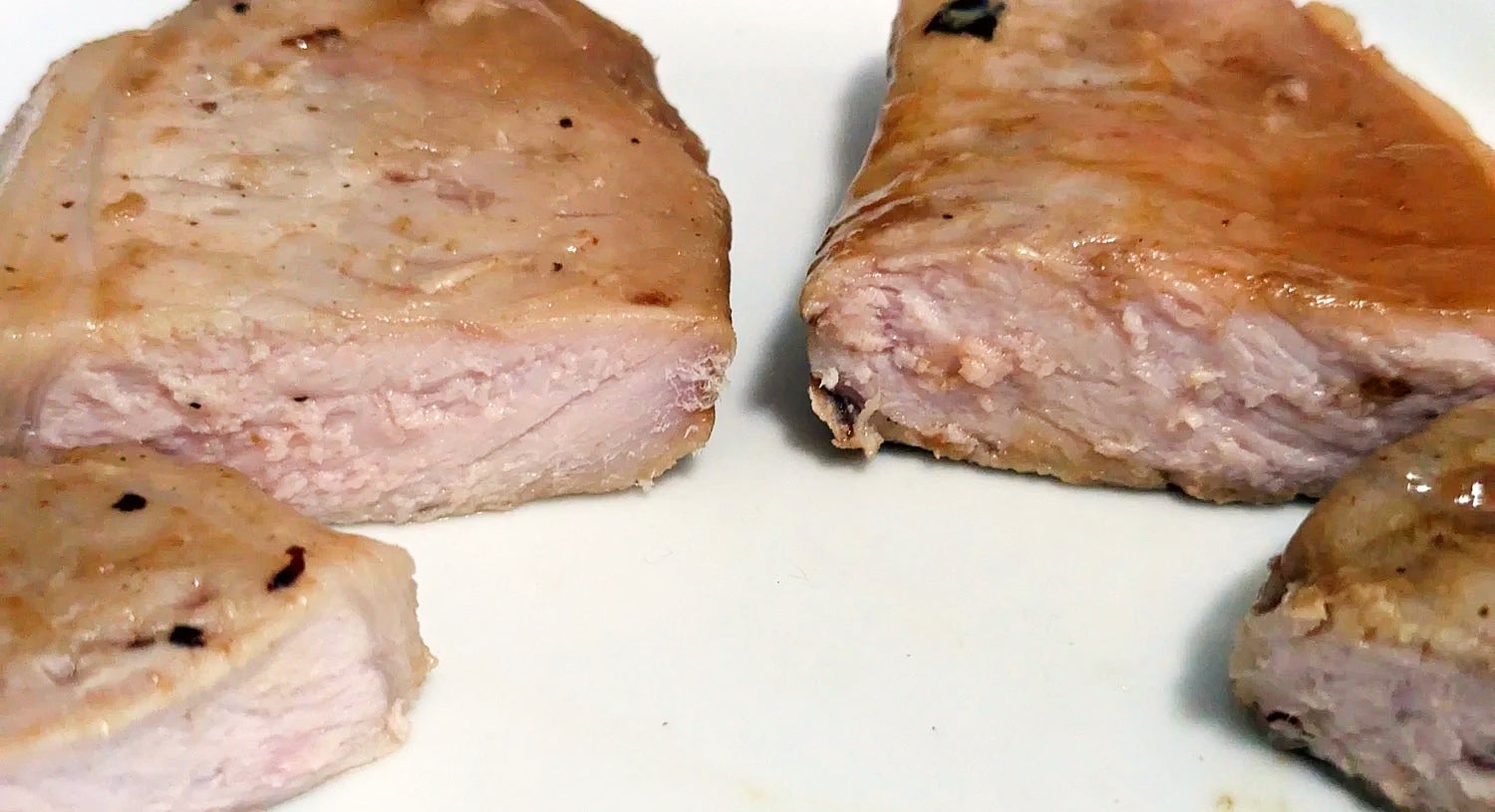
When they emerged, they looked precisely the same, and the texture and colour of the interior was the same as well.
I tried to ensure I was getting bites with the same ratio of meat and fat, and at one point, I had to close my eyes and imagine myself a more serious scientist than a person who giggles when the SodaStream makes bubbles, because I could swear the two-hour marinade had more flavour. I checked the bags, I wasn’t wrong. The two-hour pork chop was saltier; it had more of that oyster sauce flavour. I couldn’t understand why, as I worked my way through them, trying to identify it. The surface of the two-hour pork chop is what had more flavour, as if the sauce had hung on better.
Can an overnight marinade give chicken breasts a better texture?
I love a yogurt marinade on lamb or chicken, when done right, but I just don’t buy chicken breasts; I’m a dark meat girl. Breasts are kinda flavourless, but that’s precisely why I chose them. The harissa I added to the yogurt gave it a very pleasing deep, marigold colour, and the spice of the harissa and the cool yogurt were perfect foils for each other. Also, yogurt has lactic acid, which breaks down proteins, so I figured it would be interesting to see the difference. In fact, most recipes that call for yogurt marinades suggest a shorter soak.
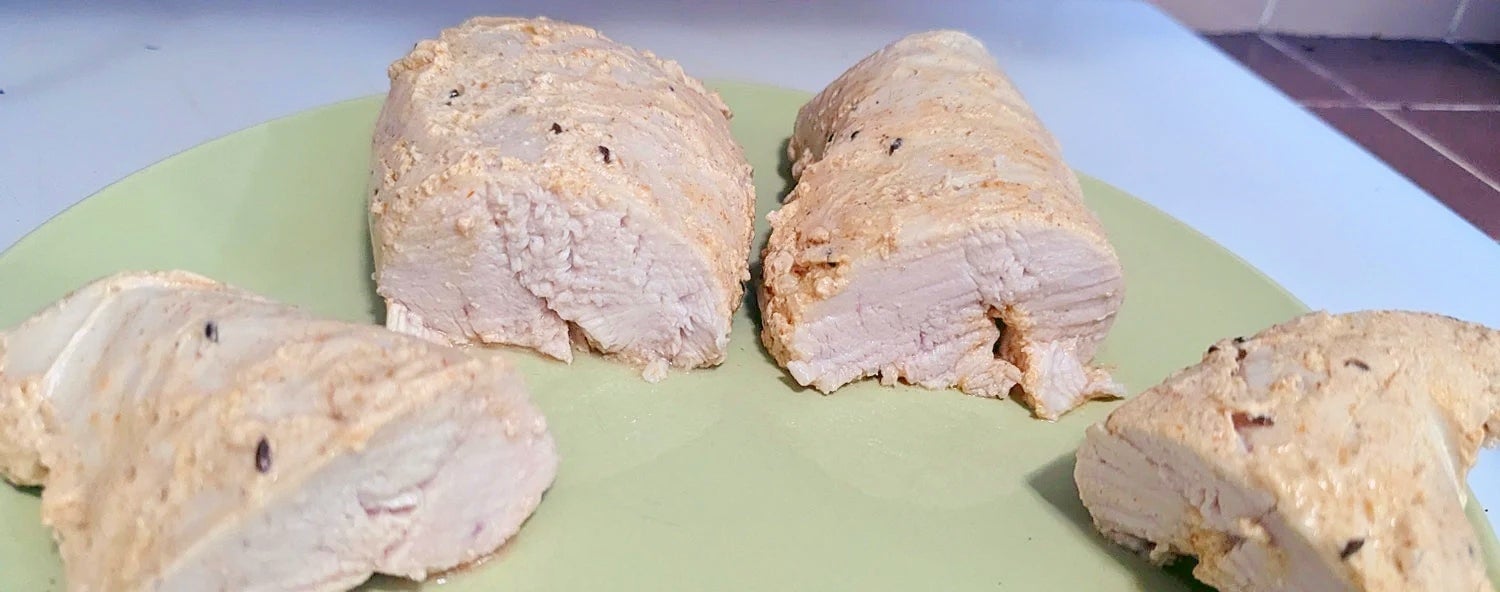
When I removed the breasts, they looked precisely the same. They, too, had been in a 142-degree bath, and I expected them to be moist and tender. Cutting into them, they looked the same, and while I was a little taken with how ready they looked to be shredded, they weren’t as moist as I’d hoped.
The surprise was that I far preferred the 24-hour marinade. The flavour and the texture of the chicken was superior, it had simply absorbed more taste on the interior from the longer marinade, and the lactic acid had affected the meat texture so that it wasn’t as mealy as the two-hour chicken. It was more tender, less rough.
The Takeaway
Putting aside all other realisations, the fact is that two hours was plenty of time for every single protein to get a good amount of flavour, certainly enough to justify the work involved, provided you have an hour or two to wait for dinner.
In some cases (eggplant and thin pork chops), two hours is actually ideal, and more time is not only unnecessary, but may be counterproductive.
That said, on tofu, in particular, that longer exposure really yielded a far tastier result. It would be worth it to test the limits of tofu marinade–is it even better after 36 hours? How does it break down in cooking?
It’s also worth noting that the ingredients in the marinade affect the outcome. Acids can have an effect on the protein separate from the taste, like the lactic acid in the chicken, which tenderized the meat more effectively over a longer period of time.
So, the crystal ball is going back in the foot locker, and I’m going to stick to my late-night dinners thrown together at the last minute, but be highly aware that should a recipe call for it, or I think of it an hour or two in advance, there’s still time to get some additional flavour into those proteins.
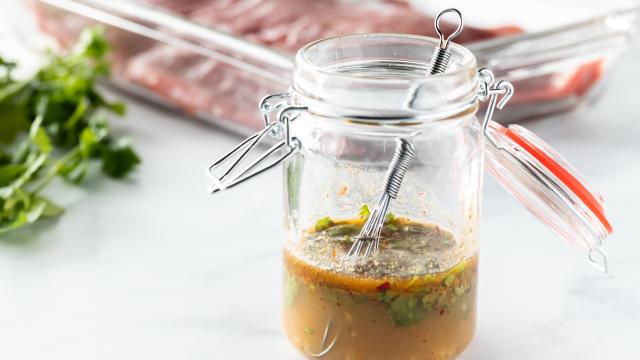
Leave a Reply
You must be logged in to post a comment.